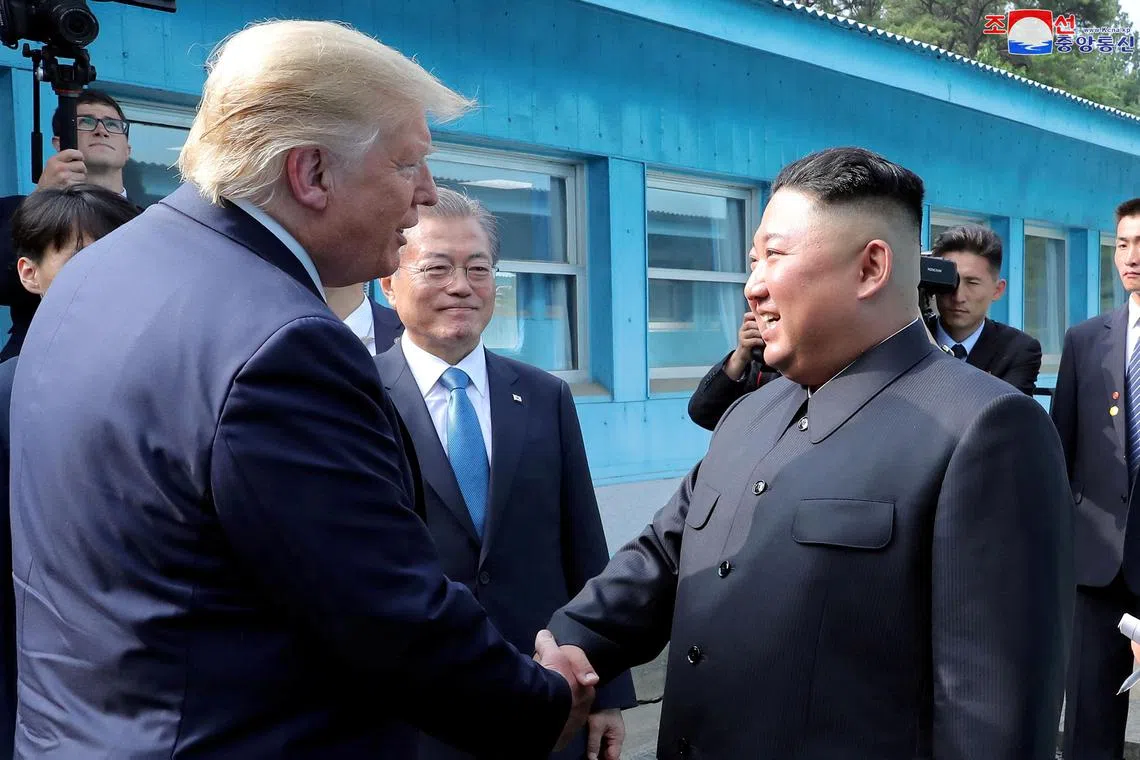Meeting South Korea, Trump could eye new chance with North Korea
Sign up now: Get ST's newsletters delivered to your inbox

Mr Donald Trump had expressed striking fondness for Mr Kim Jong Un after their three meetings.
PHOTO: REUTERS
Follow topic:
WASHINGTON - Since returning to the White House, US President Donald Trump has boasted of ending either six or seven wars – a matter of much dispute – and has been pushing with mixed success to bring peace to Ukraine.
One hot spot not yet on his second-term radar has been North Korea, despite Mr Trump’s unusually personal diplomacy during his first term when he met leader Kim Jong Un
Mr Trump could find a chance to pivot on Aug 25 as he welcomes to the White House South Korea’s new President Lee Jae Myung, an advocate of outreach with the North.
Mr Trump, who did not secure a deal on Ukraine during an Aug 15 summit in Alaska
“Having the Alaska summit not go as well as he wanted may make the president much more interested in seeing this meeting with South Korea come off very well,” said Mr Cha, Korea chair at the Centre for Strategic and International Studies.
Mr Trump had expressed striking fondness for Mr Kim after their three meetings, once offering that he and the young totalitarian “fell in love”.
But Mr Trump could find a new Mr Kim this time, one emboldened since their diplomatic love affair.
North Korea, one of the most sanctioned and isolated countries, has cashed in with Russia by supplying more than 10,000 troops plus weapons to Moscow’s offensive in Ukraine, according to Western and South Korean intelligence.
“If there is one reason why North Korea’s not interested in any of these dialogues with the South Koreans and the Americans, it’s because of all they’re getting from Russia,” Mr Cha said.
Former US president Joe Biden also offered dialogue with North Korea, albeit among lower-ranking officials, but Pyongyang rebuffed him.
Cautious start for Lee
Mr Lee won the election in June
The transition was awkwardly timed as Mr Trump was taking office, although the new South Korean administration managed to secure a deal similar to other US allies on tariffs.
Mr Lee, a former labour lawyer, hails from the left but paradoxically may share more common ground with Mr Trump than South Korea’s conservatives on some issues.
Mr Lee and Mr Trump have both in the past questioned the US military commitment to South Korea, where some 28,500 US troops are stationed.
But since taking office, Mr Lee has stressed consistency, including by going ahead with joint exercises with the United States that angered North Korea.
In a highly symbolic step, Mr Lee travelled before Washington to Japan, reaffirming his commitment to a three-way alliance despite the South Korean left’s historic criticism of Japan over colonial history.
His trip comes as tensions spike on the Korean peninsula, with Pyongyang on Aug 23 test-firing two new air defence missiles, according to the country’s state news agency.
Earlier in the week, South Korean troops fired warning shots at several North Korean soldiers who briefly crossed the heavily militarised border separating the two countries.
‘Nuclear power’ flexes
North Korea has always refused to get rid of its nuclear programme, a stance likely only to have hardened following US and Israeli bombing of Iran’s sensitive sites.
Since January, Mr Trump and Defence Secretary Pete Hegseth have both broken precedent by calling North Korea a “nuclear power”, although it did not appear they meant to recognise its right to nuclear weapons.
Mr Lee has spoken of a three-step approach of freezing, reducing and then dismantling Pyongyang’s nuclear programme.
Ms Rachel Minyoung Lee, a senior fellow at the Stimson Centre’s Korea programme, said that Mr Lee’s stance “likely will resonate with President Trump, who is keen to engage North Korea”.
“From the South Korean government’s point of view, getting the Trump administration’s buy-in on its North Korea policy would be a big diplomatic win, as it would not only put the two countries on the same page but also decrease the possibility of Seoul being sidelined from US efforts to engage North Korea,” she said.
But she doubted North Korea would back diplomacy with an ultimate goal of denuclearisation, phased or not.
“It has no reason to be receptive to such a proposition given that the geopolitical situation is working in its favour and it sees longer-term opportunities in its relationship with Russia,” she said. AFP

